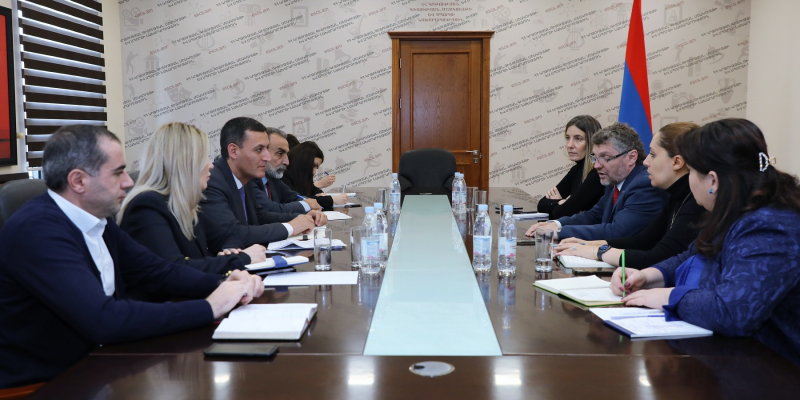RA Deputy Minister of Education, Science, Culture and Sports Arthur Martirosyan received the UN Special Rapporteur on the Promotion of Truth, Justice, Reparation and Guarantees of Non-Recurrence Fabian Salvioli.
UN Human Rights Officer Brenda Vukovic and representatives of the sectoral departments of the ESCS Ministry also participated in the meeting.
Highlighting the significance of education in fostering lasting peace and protection of human rights, the parties referred to the organization of the educational processes in Armenia. The UN Special Rapporteur inquired on how conceptual approaches to human rights protection are addressed in the education content, particularly in textbooks, and training manuals, as well as what tools are used in education for the formation of a culture of lasting peace.
ESCS Deputy Minister Arthur Martirosyan welcomed the guests in the Ministry and emphasized the mission of the UN Special Rapporteur on the Promotion of Truth, Justice, Reparation and Guarantees of Non-Recurrence, Fabian Salvioli: “Indeed, the role of education is very important in terms of lasting peace,” stated the Deputy Minister, pointing out that the concept “anti” has never been integrated into the content of Armenian education.
“The current state standard for general education places equal emphasis on learner’s values and viewpoints which, of course, completely align with the conceptual standards of human rights protection,” stated Arthur Martirosyan, emphasizing that the new standard's recommended capacities include a distinct component dedicated to civic and democratic capacity.
“State-oriented approaches dominate the content of general education. Despite the challenges faced by our country and people throughout history, Armenia's educational programs have always been designed with the aim of instilling love for and a desire to protect our country, as well as shaping the formation of consciousness,” emphasized Arthur Martirosyan noting that state standards and general education programs are fully aligned with the goal of cultivating a culture of lasting peace.
UN Special Rapporteur on the Promotion of Truth, Justice, Reparation and Guarantees of Non-Recurrence, Fabian Salvioli underscored the significance of integrating a thorough and equitable representation of historical truths into educational curricula to showcase the most impartial approaches. Arthur Martirosyan emphasized the need to analyze Azerbaijan's general education curriculum based on international standards to identify instances of Armenophobia.
The Deputy Minister also informed that starting from the 2022-2023 academic year, regional languages, such as Georgian, Turkish, Persian and Azerbaijani - are being taught in secondary schools, which has already aroused great interest among students
During the meeting, the ESCS Deputy Minister also touched upon several fundamental rights of forcibly displaced people from Nagorno-Karabakh, such as the right to education, and presented the work carried out by the RA Government in this regard. Arthur Martirosyan pointed out that the 10-month blockade of Nagorno-Karabakh, the humanitarian crisis, and the subsequent large-scale military attack and targeting of civilians and infrastructure resulted in the forced displacement of the entire indigenous Armenian population of Nagorno-Karabakh from their homeland, abandoning a thousand-year cultural and religious heritage.
The ESCS Deputy Minister drew the attention of the UN Special Rapporteur to the issue of preserving the historical and cultural monuments of Nagorno-Karabakh, in particular, presenting Azerbaijan's policy of eliminating the Armenian trace from Nagorno-Karabakh by destroying or distorting historical and cultural monuments.
Arthur Martirosyan emphasized the importance of international organizations, particularly the UN, in preserving the Armenian historical and cultural legacy in Nagorno-Karabakh, presenting that Azerbaijan keeps preventing the sending of the UNESCO fact-finding mission to Nagorno-Karabakh for independent monitoring and mapping of cultural heritage.
During the meeting, the parties also considered several other issues of mutual interest.






